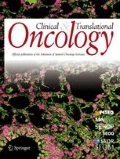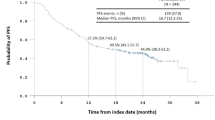Abstract
Purpose
Cisplatin is commonly used in non-small-cell lung cancer (NSCLC) chemotherapy; however, chemoresistance to cisplatin remains a great clinical challenge. Octamer-binding protein 4 (OCT4) has been reported to be overexpressed in NSCLC. In this study, we aimed to investigate the potential role of OCT4 in NSCLC with chemoresistance to cisplatin.
Methods
Expressions of OCT4 was detected in NSCLC tissues and cell lines. We utilized siRNA to knock down OCT4 expression in human NSCLC cells and analyzed their phenotypic changes.
Results
We found that the difference of OCT4 expression between NSCLC and the adjacent non-tumourous tissues was statistically significant. Knockdown of OCT4 in NSCLC cells could decrease cell proliferation, and potentiate apoptosis induced by cisplatin, suggesting OCT4 may contribute to cisplatin resistance in NSCLC.
Conclusion
Our findings indicate that targeting OCT4 could improve cisplatin effect in NSCLC, confirming their role in modulating cisplatin sensitivity.






Similar content being viewed by others
References
Saintigny P, Burger JA. Recent advances in non-small cell lung cancer biology and clinical management. Discov Med. 2012;13:287–97.
Tassinari D, Carloni F, Santelmo C, Tamburini E, Lazzari Agli L, Tombesi P, et al. Second line treatments in advanced platinum-resistant non small cell lung cancer. A critical review of literature. Rev Recent Clin Trials. 2009;4:27–33.
Szakacs G, Paterson JK, Ludwig JA, Booth-Genthe C, Gottesman MM. Targeting multidrug resistance in cancer. Nat Rev Drug Discov. 2006;5(3):219–34.
Mok TS, et al. Gefitinib or carboplatin-paclitaxel in pulmonary adenocarcinoma. N Engl J Med. 2009;361:947–57.
Brugger W, et al. Prospective molecular marker analyses of EGFR and KRAS from a randomized, placebo-controlled study of erlotinib maintenance therapy in advanced non-small-cell lung cancer. J Clin Oncol. 2011;29:4113–20.
Chen YC, Hsu HS, Chen YW, Tsai TH, How CK, Wang CY, et al. Oct-4 expression maintained cancer stem-like properties in lung cancer-derived CD133positive cells. PLoS One. 2008;3:e2637.
Li XL, Jia LL, Shi MM, Li X, Li ZH, Li HF, et al. Downregulation of KPNA2 in non-small-cell lung cancer is associated with Oct4 expression. J Transl Med. 2013;11:232.
Li X, Wang J, Xu Z, Ahmad A, Li E, Wang Y, et al. Expression of sox2 and oct4 and their clinical significance in human non-small-cell lung cancer. Int J Mol Sci. 2012;13:7663–75.
Lu Q, Lu S, Huang L, Wang T, Wan Y, Zhou CX, Zhang C, Zhang Z, Li X. The expression of V-ATPase is associated with drug resistance and pathology of non-small-cell lung cancer. Diagn Pathol. 2013;8:145.
Inoue A, Suzuki T, Fukuhara T, Maemondo M, Kimura Y, et al. Prospective phase II study of gefitinib for chemotherapy-naive patients with advanced non-small-cell lung cancer with epidermal growth factor receptor gene mutations. J Clin Oncol. 2006;24:3340–6.
Tamura K, Okamoto I, Kashii T, Negoro S, Hirashima T, et al. Multicentre prospective phase II trial of gefitinib for advanced non-small cell lung cancer with epidermal growth factor receptor mutations: results of the West Japan Thoracic Oncology Group trial (WJTOG0403). Br J Cancer. 2008;98:907–14.
Mok TS, Wu YL, Thongprasert S, Yang CH, Chu DT, et al. Gefitinib or carboplatin-paclitaxel in pulmonary adenocarcinoma. N Engl J Med. 2009;361:947–57.
Boyer MJ, Gu L, Wang X, Kelsey CR, Yoo DS, Onaitis MW, et al. Toxicity of definitive and post-operative radiation following ipilimumab in non-small cell lung cancer. Lung Cancer. 2016;98:76–8.
Kim JB, Greber B, Araúzo-Bravo MJ, Meyer J, Park KI, Zaehres H, et al. Direct reprogramming of human neural stem cells by OCT4. Nature. 2009;461:649–53.
Zeineddine D, Hammoud AA, Mortada M, Boeuf H. The Oct4 protein: more than a magic stemness marker. Am J Stem Cells. 2014;3:74.
Zhao S, Yuan Q, Hao H, Guo Y, Liu S, Zhang Y, et al. Expression of OCT4 pseudogenes in human tumours: lessons from glioma and breast carcinoma. J Pathol. 2011;223:672–82.
Meng HM, Zheng P, Wang XY, Liu C, Sui HM, Wu SJ, et al. Over-expression of Nanog predicts tumor progression and poor prognosis in colorectal cancer. Cancer Biol Ther. 2010;9:295–302.
Wen J, Park JY, Park KH, Chung HW, Bang S, Park SW, et al. Oct4 and Nanog expression is associated with early stages of pancreatic carcinogenesis. Pancreas. 2010;39:622–6.
Author information
Authors and Affiliations
Corresponding author
Ethics declarations
Conflict of interest
There is no conflict of interests to disclose.
Rights and permissions
About this article
Cite this article
Liu, X., Ma, M., Duan, X. et al. Knockdown of OCT4 may sensitize NSCLC cells to cisplatin. Clin Transl Oncol 19, 587–592 (2017). https://doi.org/10.1007/s12094-016-1569-y
Received:
Accepted:
Published:
Issue Date:
DOI: https://doi.org/10.1007/s12094-016-1569-y




